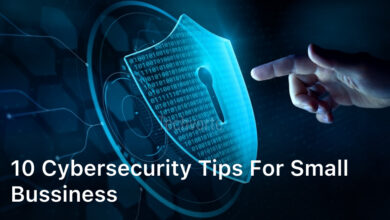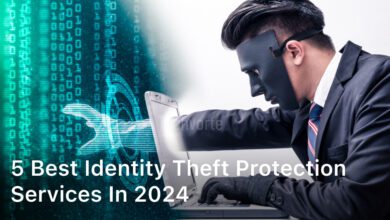In the digital era, protecting your online privacy is paramount.
With cyber threats like data breaches and surveillance on the rise, safeguarding your personal information and digital footprint has become essential.
This article will provide you with crucial internet safety tips and cybersecurity best practices to enhance your online privacy and maintain digital safety.
We’ll explore powerful tools like data encryption, VPNs and ad blockers that can help you browse the web securely and maintain your anonymity.
Additionally, we’ll delve into techniques for anonymous web surfing and identity theft prevention, empowering you to take control of your digital footprint and secure browsing experience.
Understand the Importance of Online Privacy
In the digital age, protecting your online privacy has become a paramount concern.
As our lives become increasingly intertwined with the virtual realm, safeguarding our personal information and digital footprint is essential for maintaining control over our data and preventing potential threats.
Why Online Privacy Matters
Online privacy is a fundamental right that allows individuals to control the flow of their personal information and maintain their digital anonymity.
It protects us from unauthorized access, surveillance, and exploitation of our data.
By preserving our online privacy, we can engage in secure browsing, communicate confidentially and express ourselves freely without fear of repercussions or harassment.
Risks of Compromised Privacy
However, when our online privacy is compromised, we become vulnerable to a range of risks.
Identity theft, financial fraud and even physical harm can result from the misuse of our personal data.
Cybercriminals can exploit our information for nefarious purposes, such as phishing attacks, unauthorized access to accounts or extortion attempts.
Additionally, a lack of internet safety tips and cybersecurity best practices can expose us to surveillance, targeted advertising and invasions of our digital footprint.
Ultimately, understanding the significance of online privacy and the risks associated with a compromised digital footprint is crucial for protecting ourselves in the digital realm.
By implementing effective strategies and embracing a privacy conscious mindset, we can safeguard our personal information and maintain control over our online presence.
Encrypt Your Data for Secure Communication
In the digital age, protecting your online privacy and secure browsing are paramount.
One powerful tool to achieve this is data encryption, which scrambles your data, making it unreadable to anyone without the proper decryption key.
Encryption ensures that your communications, files and online activities remain private and secure, shielding you from unauthorized access and prying eyes.
Benefits of Data Encryption
Data encryption offers numerous benefits that contribute to your overall cybersecurity best practices.
Firstly, it prevents unauthorized access to your sensitive information, such as financial data, personal messages, and confidential documents.
By encrypting your data, you can safeguard it from cybercriminals, hackers and other malicious actors who may attempt to intercept or steal your information.
Additionally, data encryption helps maintain confidentiality and protect your online privacy.
It ensures that your communications and online activities remain secure and private, preventing eavesdropping and preserving your digital footprint.
Popular Encryption Tools and Methods
Various encryption tools and methods are available to enhance your online security and protect your online privacy.
End-to-end encryption, widely used in secure messaging apps like Signal and WhatsApp, ensures that only the intended recipients can access the encrypted data, even if it is intercepted during transmission.
Virtual Private Networks (VPNs) provide another layer of encryption by creating a secure tunnel between your device and the VPN server, protecting your internet traffic and masking your IP address.
By using a reputable VPN service, you can browse the web securely and maintain your online anonymity.
Other encryption methods, such as disk encryption and file encryption, allow you to secure your local data, preventing unauthorized access even if your device is lost or stolen.
By implementing these data encryption strategies, you can take proactive steps to protect your online privacy and secure browsing experience.
Protect Your Online Privacy with a VPN
In the digital age, safeguarding your online privacy has become paramount.
One powerful tool that can significantly enhance your online privacy is a Virtual Private Network (VPN).
A VPN encrypts your internet connection and masks your IP address, creating a secure tunnel between your device and the VPN server.
This protects your online activities from prying eyes, ensuring that your browsing remains anonymous and secure.
What is a VPN and How Does it Work?
A VPN functions by establishing an encrypted connection between your device and a remote server operated by the VPN provider.
All your internet traffic is routed through this secure tunnel, effectively hiding your IP address and masking your online activities from your internet service provider (ISP), hackers and other third parties.
This encrypted connection prevents anyone from intercepting or monitoring your data, protecting your online privacy and secure browsing.
Choosing the Right VPN Provider
With numerous VPN providers available, selecting the right one is crucial for ensuring optimal privacy and security.
When choosing a VPN provider, consider factors such as robust encryption protocols, a strict no logs policy, a wide range of server locations for anonymous web surfing and user friendly apps for various devices.
Reputable VPN providers like NordVPN, ExpressVPN and Private Internet Access are known for their strong privacy features and commitment to protecting their users’ online privacy.
Secure Your Web Browsing with Ad Blockers
In the digital age, protecting your online privacy has become paramount.
One crucial tool in safeguarding your digital footprint is the use of ad blockers.
These browser extensions or plugins prevent advertisements from loading, reducing the amount of data collected about your online activities and behavior.
How Ad Blockers Enhance Privacy
Advertisements often employ tracking mechanisms that monitor your browsing habits for targeted advertising purposes.
By blocking these ads, ad blockers prevent this intrusive tracking, thereby enhancing your secure browsing experience and protecting your online privacy.
Moreover, ad blockers can block trackers embedded in websites, preventing fingerprinting techniques that identify and track your device.
With ad blockers, you can browse the web without leaving a trail of your digital footprint, which could potentially be exploited by advertisers or malicious actors.
This not only safeguards your personal information but also contributes to a more streamlined and ad-free browsing experience, allowing you to focus on the content you want without distractions.
Anonymous Web Surfing Techniques
In an era where online privacy is paramount, anonymous web surfing techniques have emerged as powerful tools to and maintain your digital anonymity.
By leveraging these methods, you can effectively browse the internet without leaving a trail of personal information, shielding your online activities from prying eyes.
Tor Browser and Onion Routing
The Tor Browser is a highly acclaimed solution that employs onion routing, a technique that encrypts and routes your internet traffic through multiple nodes or relays, across the Tor network.
This process makes it incredibly difficult for anyone to trace your online activities back to your actual IP address, providing a robust layer of and anonymity.
Private Browsing Modes
Most modern web browsers offer a private browsing mode that can enhance your by preventing the storage of browsing history, cookies and cached data on your device.
While this mode does not provide the same level of anonymity as the Tor Browser, it can still help protect your privacy by limiting the digital footprint you leave behind during your browsing sessions.
To maximize the benefits of these techniques, it is advisable to combine them with other privacy enhancing tools and best practices, such as using a reputable virtual private network (VPN) and regularly clearing your browser cache and history.
By taking a comprehensive approach to online privacy, you can effectively safeguard your personal information and maintain a secure online presence.
Prevent Identity Theft and Protect Your Digital Footprint
In the digital age, protecting your online privacy is paramount to safeguarding your identity and personal information from exploitation.
Your digital footprint, which encompasses all the data trails and information you leave online, can be a prime target for identity thieves.
By monitoring your digital footprint and implementing effective identity theft prevention strategies, you can significantly reduce the risk of falling victim to this insidious crime.
Monitoring Your Digital Footprint
Keeping track of your digital footprint is the first step in protecting your online privacy and preventing identity theft.
Conduct regular online searches for your name, email addresses and other personal details to identify any unauthorized or suspicious information.
Utilize privacy tools and services that allow you to monitor and manage your online presence effectively.
Additionally, be cautious about the information you share online, as even seemingly innocuous details can be exploited by cybercriminals.
Identity Theft Prevention Tips
Preventing identity theft requires a proactive approach and the implementation of best practices.
Use strong, unique passwords for all your accounts and enable two-factor authentication whenever possible.
Be vigilant against phishing attempts, which often involve fraudulent emails or websites designed to trick you into revealing sensitive information.
Additionally, regularly monitor your financial statements and credit reports for any unauthorized activities or irregularities that could indicate identity theft.
Internet Safety Tips for Protecting Your Online Privacy
In today’s digital age, protecting your online privacy is paramount.
Cybercriminals and malicious actors are constantly seeking ways to exploit vulnerabilities and gain unauthorized access to your personal information.
To safeguard your privacy and maintain a secure online presence, it’s essential to adopt a comprehensive approach that encompasses various aspects of your digital life.
Secure Your Devices and Accounts
One of the most effective ways to protect your online privacy is to secure your devices and accounts.
Start by using strong, unique passwords for each of your accounts and enabling two factor authentication (2FA) whenever possible.
This additional layer of security ensures that even if your password is compromised, unauthorized access to your accounts will be significantly more challenging.
Keeping your software and operating systems up-to-date is also crucial for maintaining cybersecurity best practices.
Software updates often include patches for known vulnerabilities, enhancing the secure browsing experience and protecting your online privacy from potential threats.
Be Cautious with Public Wi-Fi Networks
While public Wi Fi networks offer convenience, they can also pose significant risks to your online privacy.
These networks are often unsecured, making them vulnerable to eavesdropping and man-in-the-middle attacks.
Cybercriminals can potentially intercept your internet traffic, gaining access to sensitive information such as login credentials, financial data and personal communications.
When using public Wi-Fi networks, it’s advisable to avoid accessing sensitive accounts or transmitting sensitive data.
If you must use public Wi-Fi, consider using a virtual private network (VPN) to encrypt your internet traffic and protect your online privacy from prying eyes.
By implementing these internet safety tips and adhering to cybersecurity best practices, you can significantly reduce the risk of privacy breaches and cyber threats.
Remember, protecting your online privacy is an ongoing effort that requires vigilance and proactive measures to maintain a secure digital footprint.
Conclusion
In the ever-evolving digital landscape, safeguarding your online privacy has become an indispensable necessity.
The strategies and techniques outlined throughout this article, such as leveraging encryption, employing VPNs, utilizing ad blockers and embracing anonymous browsing techniques, empower you to take control of your digital footprint and fortify your personal information against potential threats.
It is crucial to recognize that online privacy is not a luxury but a fundamental right in our interconnected world.
Maintaining vigilance, adhering to best practices and prioritizing digital safety are paramount to preserving your privacy and shielding yourself from cyber risks.
Implement these measures proactively to cultivate a secure online presence and mitigate the chances of falling victim to privacy breaches, identity theft or other nefarious activities.
By embracing the principles and solutions outlined in this comprehensive guide, you can navigate the digital realm with confidence, knowing that your personal information and online activities are protected from prying eyes.
Stay informed, be proactive and make online privacy a top priority to ensure a safer and more secure digital experience.
FAQ
Why is online privacy important?
Online privacy is crucial for protecting your personal information, maintaining digital anonymity and preventing unauthorized access, surveillance and exploitation of your data. It safeguards you from risks such as identity theft, financial fraud, and even physical harm.
What is data encryption, and how does it protect my privacy?
Data encryption is the process of scrambling data, making it unreadable to anyone without the proper decryption key. It ensures that your communications, files, and online activities remain private and secure, preventing unauthorized access and protecting sensitive information.
How does a VPN (Virtual Private Network) enhance online privacy?
A VPN encrypts your internet connection and masks your IP address, creating a secure tunnel between your device and the VPN server. This protects your online activities from prying eyes and allows you to browse anonymously.
What are the benefits of using ad blockers for online privacy?
Ad blockers prevent advertisements from loading, reducing the amount of data collected about you through tracking and targeted advertising. They block trackers, prevent fingerprinting, and protect your digital footprint.
How can I browse the web anonymously?
Anonymous web surfing techniques, such as the Tor Browser and onion routing system, or private browsing modes in regular web browsers, can help you browse the internet without leaving a trail of personal information.
How can I protect myself from identity theft and monitor my digital footprint?
To prevent identity theft, monitor your digital footprint by conducting regular online searches, using privacy tools, and being cautious about the information you share online. Additionally, use strong passwords, enable two-factor authentication, and be vigilant against phishing attempts.
What are some general internet safety tips for protecting my online privacy?
Secure your devices and accounts with strong passwords and two-factor authentication, keep your software and operating systems up-to-date, and be cautious when using public Wi-Fi networks, which can be vulnerable to eavesdropping and man-in-the-middle attacks.





